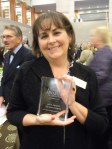One day my book will be finished and it will be archived at the Library of Virginia. Until that day, I live vicariously through my author friends (author, as in published book; not writer, as in still working on one).

Adriana Trigiani, Earl Hamner and Richard Thomas celebrate Hamner's Literary LIfetime Achievement Award. (photo by Cynthia Price)
The best way for me to do that is at the annual Library of Virginia Literary Awards. As in years past, Adriana Trigiani hosted the evening. Herself a gifted and prolific writer, she always provides plenty of laughter and nuggets throughout the evening. This year was no exception. She related a story about writers.
“You’re a very dangerous person,” she said of writers. “Nothing is sacred.”
She talked about eavesdropping on some women on her flight to Richmond. All of us writers, scribbled the story down thinking, “This could work in my book.”
What did they say? They were talking about attending a wedding, and one of the women, in her best Southern drawl said, “First we’re going to socialize, then we’re going to scrutinize.”
Seriously, I couldn’t write it better than that.
While I try to be professional – after all, it is a black tie evening – I couldn’t help but introduce myself to Jan Karon, whose books I devoured during a few weeks after discovering them. Her Mitford Series, Adriana said, changed lives. And as Jan told me, “I try to give you a bit of peace from today’s crazy world.”
I can’t wait to read In the Company of Others, which won the People Choice Award for Fiction this year. She said of her win,” I am shaken, thrilled and delighted.” And she shared what almost everyone in the audience thinks about libraries, “It makes my heart beat faster to be in a library.”
And the evening is about being seen. Even Adriana admits to falling prey to it, describing David Baldacci, who presented the Emyl Jenkins Sexton Fiction Award, as “eye candy.” In talking with him about it later, he just laughed and rolled his eyes. I’ve always enjoyed his books, but as an aspiring author, I appreciate the time he has always given to writers.
The award he presented is always bittersweet as I remember my dear friend Emyl Jenkins. She continues to sprinkle fairy dust on me from afar, and for that I always will be grateful.
The highlight this year for me was watching my friend Julie Campbell win the People’s Choice Award for Nonfiction for her book The Horse in Virginia.
For many in the audience, the highlight was watching Earl Hamner receive the Literary Lifetime Achievement Award, which was presented by John-Boy Walton himself, Richard Thomas. As Hamner spoke, I was taken back to my childhood days, watching The Waltons with my family. At the beginning and ending of each episode, we heard Hamner speak and wrap up the episode, usually with a philosophical thought.
Thomas described each episode as “an American short story” and said of Hamner, “He wrote these wonderful words for us to say.”
Hamner told the audience, “Virginia has given me fine gifts,” including “the wellspring of everything I have written.”
Until next year’s Library of Virginia event, good night John-Boy.




